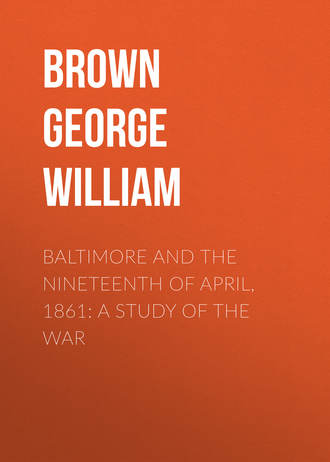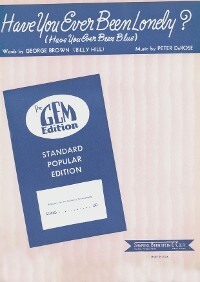
Baltimore and the Nineteenth of April, 1861: A Study of the War
"In the evening there was a banquet at the Eutaw House, and Judge Geo. William Brown, who was Mayor of Baltimore in 1861, presided. Nearly two hundred persons were at table. After the dinner was over, Judge Brown said:
"'This is the 19th of April, a day memorable in the annals of this city, and in the annals of the country. It is filled in my mind with the most painful recollections of my life, and I doubt not that many who are here present share with me those feelings. I shall make but brief allusions to the events of that day. The city authorities of Baltimore of that time have mostly passed away, and I believe I am the only one here present to-night. In justice to the living and the dead I have to say that the authorities of Baltimore faithfully endeavored to do their duty. It is not necessary for me, perhaps, to say so in this presence. (Applause.) It was not their fault that the Massachusetts Sixth Regiment met a bloody reception in the streets of Baltimore. The visit of that regiment on both occasions has a great and important significance. What did it mean in 1861? It meant civil war; that the irrepressible conflict which Mr. Seward predicted had broken out at last, and that, as Mr. Lincoln said, a house divided against itself cannot stand. A great question then presented itself to the country. When war virtually began in Baltimore, by bloodshed on both sides, it meant that the question must be settled by force whether or not the house should stand. It took four years of war, waged with indomitable perseverance, to decide it, because the combatants on both sides were sustained by deep and honest convictions. It is not surprising, looking back coolly and calmly on the feelings of that day, that they found vent as they did. I am not here to excuse or to apologize, but to acknowledge facts. That was the significance of the first visit of the Massachusetts Sixth Regiment, in response to the call of the President of the United States. After the war there was peace. But enforced peace is not sufficient in a family of States any more than in a household. There must be among brothers respect, confidence, mutual help and forbearance, and, above everything, justice and right. After nineteen years the visit of survivors of the Sixth Massachusetts is, I hope, significant of more than peace. It is, I hope, significant of the fact that there is a true bond of union between the North and the South (applause), and that we are a family of States, all equal, all friends; and if it be, there is no one in the country who can more fervently thank God than myself that the old house still stands.' (Applause.)
"Judge Brown offered as a toast: 'The Sixth Regiment of Massachusetts: Baltimore extends to her fraternal greeting.'"
1
At Fort Sumter, it is true, one week earlier, the first collision of arms had taken place; but strangely, that bombardment was unattended with loss of life. And it did not necessarily mean war between North and South: accommodation still seemed possible.
2
The Life of Abraham Lincoln, p. 526; and see Appendix I.
3
Judge Taney's utterance on this subject has been frequently and grossly misrepresented. In Appendix II. will be found what he really did say.
4
Lamon's Life of Lincoln, p. 808.
5
John P. Kennedy, of Baltimore, the well-known author, who had been member of Congress and Secretary of the Navy, published early in 1861 a pamphlet entitled "The Border States, Their Power and Duty in the Present Disordered Condition of the Country." His idea was that if concert of action could be had between the Border States and concurring States of the South which had not seceded, stipulations might be obtained from the Free States, with the aid of Congress, and, if necessary, an amendment of the Constitution, which would protect the rights of the South; but if this failed, that the Border States and their allies of the South would then be forced to consider the Union impracticable and to organize a separate confederacy of the Border States, with the association of such of the Southern and Free States as might be willing to accede to the proposed conditions. He hoped that the Union would thus be "reconstructed by the healthy action of the Border States." The necessary result, however, would have been that in the meantime three confederacies would have been in existence. And yet Mr. Kennedy had always been a Union man, and when the war broke out was its consistent advocate.
These proposals, from such different sources as Fernando Wood and John P. Kennedy, tend to show the uncertainty and bewilderment which had taken possession of the minds of men, and in which few did not share to a greater or less degree.
6
The culmination of this period of misrule was at the election in November, 1859, when the fraud and violence were so flagrant that the Legislature of the State unseated the whole Baltimore delegation – ten members. The city being thus without representation, it became necessary, when a special session of the Legislature was called in April, 1861, that a new delegation from Baltimore should be chosen. It was this same Legislature (elected in 1859), which took away from the mayor of the city the control of its police, and entrusted that force to a board of police commissioners. This change, a most fortunate one for the city at that crisis, resulted in the immediate establishment of good order, and made possible the reform movement of the next autumn.
7
Hanson's Sixth Massachusetts Regiment, p. 14.
8
According to some of the published accounts seven cars got through, which would have been one to each company, but I believe that the number of the cars and of the companies did not correspond. Probably the larger companies were divided.
9
For participation in placing this obstruction, a wealthy merchant of long experience, usually a very peaceful man, was afterward indicted for treason by the Grand Jury of the Circuit Court of the United States in Baltimore, but his trial was not pressed.
10
The accounts in some of our newspapers describe serious fighting at a point beyond this, but I am satisfied they are incorrect.
11
Testimony of witnesses at the coroner's inquest.
12
Baltimore American, April 22.
13
Winans's steam gun, a recently invented, and, it was supposed, very formidable engine, was much talked about at this time. It was not very long afterwards seized and confiscated by the military authorities.
14
4 Wallace Sup. Court R. 2.
15
See also the "Chronicles of Baltimore" by the same author.
16
Legal Tender Case, Vol. 110 U. S. Reports, p. 421.
17
Mr. Ferrandini, now in advanced years, still lives in Baltimore, and declares the charge of conspiracy to be wholly absurd and fictitious, and those who know him will, I think, believe that he is an unlikely person to be engaged in such a plot.


